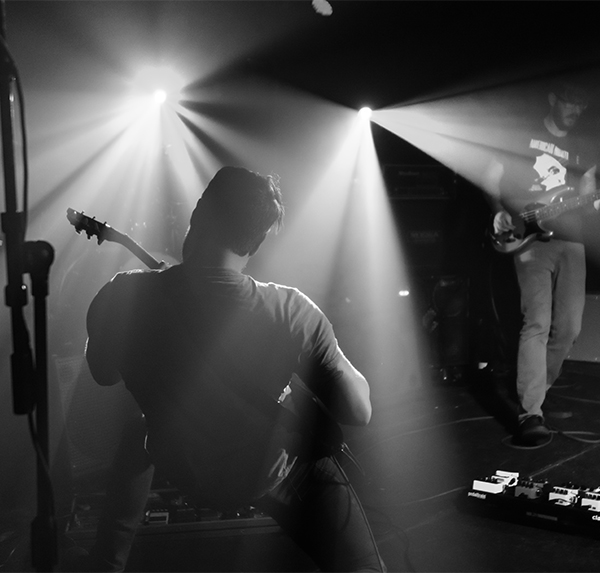Interview by Shannon Lawlor
You.may.die.in.the.desert are an overwhelmingly-atmospheric three piece instrumental-rock band currently based in Seattle, Washington. Since 2005, You.may.die.in.the.desert have been a driving force in the underground indie and post-rock scenes, and to date, the band have released numerous EPs, including the wonderfully blistering Harmonic Motion Vol.1 (Split EP with Gifts From Enola) and a 2012 LP International Waters, which received positive reviews among their associated scenes.
For the last couple of years, You.may.die.in.the.desert have been further developing and crafting their unique live experience for an audience who some might say, possibly just want a bit too much – but every time, YouMayDie (for short) succeed with their jaw-droppingly intense live show. In April 2018, YouMayDie released a 7” vinyl titled Patient Glaciers, which has completely portrayed their inevitable progression and ability to further impress, release after release, show after show.
We caught up with You.may.die.in.the.desert on sub-genres and using too much delay:
For those unfamiliar with you.may.die.in.the.desert’s (YouMayDie for short) sonic-luminosity, how would you personally describe the music you collectively create?
Brandon: I think we create progressive, dynamic, instrumental music. We intentionally play instrumental music so that people are forced to listen to the music and make their own meanings from the songs.
Brian: Over the years our music has been influenced by many different genres and that tends to come out in our style of writing. We all started out as a Tristeza-meets-Pinback sort of band, and then transitioned into more heavy elements of free jazz, or prog-rock style of music using odd time signatures and polyrhythms. I have found that it’s just easier to describe us as non-conventional post-rock.
Your latest overwhelmingly beautiful offering Patient Glaciers was released back in October 2017 via Mic-in-a-Room. Could you detail this recording process? And explain how it may have differed to recording 2012’s International Waters?
Brian: I think what makes this album so different from the others we’ve recorded, is that with each song we really had a theme and set of emotions we wanted to capture. In past recordings, such as International Waters, we had just made songs that sounded good to us and didn’t really think whether they had meaning to it or not. Besides writing content and the fact that Patient Glaciers is recorded on a different format, I would say another difference is that we mixed/mastered this album differently. Normally we would just have whomever recorded us, mix and master the tracks and send it off. We recorded this album at Decade Sound Studios, in Tacoma, WA, by Ahren Lanfor. This time around was different because we brought in a friend of ours, Matt Dillon (Sound of Titans: Remix/Remaster) to use his magic on mixing these songs for vinyl which is a different process than mixing for CD. Matt then got us connected with Jamie King, who has worked with some huge bands (Between The Buried And Me) and he got this mastered for us.
How do you feel about the whole (mostly overlooked) post-rock scene, or tag? Most bands categorised under this term seem to shy away, and try not to associate themselves with ‘post-rock’, under it’s own unique genre and musical expression. What are your thoughts on this?
Michael: The genre ‘Post-Rock’ by literary definition is confusing (After Rock). Also, the general nature of the label fails to cover the vast and eclectic style of music under this category, meanwhile, “Metal,” for example, has developed numerous sub-genres to better describe differing styles. I do not doubt that “Post-Rock” will eventually sprout its own sub-genres which will hopefully lead to these bands feeling more comfortable with the association.
‘Post-Rock’ is definitely overlooked as a whole but it depends on your perspective and what style represents the quintessential ‘Post Rock’ band or songwriter. I’ve seen many bands gain popularity in the instrumental/tech/math-rock style as well as bands in the “wall-of-sound” group. So right there you basically have attention on both ends of a spectrum.
In conclusion, I do not think the ‘Post Rock’ label is anything to shy away from. Just compose the music you feel and if you are labeled as such, so be it. I feel this way in general with any genre. What is You May Die, REALLY?
If you.may.die.in.the.desert could choose that one ”dream collaboration”, with anyone on the planet, who would it be with, and why?
Michael: Radiohead, Sigur Ros
Brian: For me it would be Radiohead and Tristeza. Tristeza because they were the first band to get me interested in playing instrumental music and I think it would really be a wild experience to see how our styles would sound together. And Radiohead, because I have always love their unique approach to writing and its really beautiful and inspiring music.
Going back a bit here: Could you possibly detail the meaning, or inspiration behind “Seagulls = Sea Eagles” initially released on your 2008 split Harmonic Motion Vol.1 with now defunct Virginia-based band Gifts From Enola?
Brian: Well as far as the title goes it was just something I came up with while drinking with some friends. I remember talking with my friend Alex (aka Sox) about his thoughts on seagulls and if they were the eagles of the sea. When we wrote that track we wanted to try our hand at looping guitar parts and that was actually a challenge, and is one of the reasons we don’t play it live anymore. You have to be fairly precise with the DL4 loop pedals, and a lot of them tend to be sort of touchy. My loops would get off time slightly after a while due to this pedal malfunction, and its actually one of the reasons why I reverse my guitar samples now days.
Are there any instruments, pieces of equipment, hardware/software that you feel is absolutely essential in creating YouMayDie’s signature, texture-driven sound?
Brian: As with most post-rock bands, DELAY ! Michael has to tell me to stop writing every song with delay hahah! Another thing for me is the correct guitar. I actually love the way Fenders look and have owned 5 but had to get rid of all of them because they are too thin for our style of music and have less frets than what I need. I currently play Gibson guitars (SG) because they tend to be more bold and cut through the mix, which is key when you have only 3 band members.
It’s clear through YouMayDie’s music that emotion, and intensity are number one factors in portraying your true expression. How do you feel your records translate to performing live? Do you find it more difficult to perform certain pieces due to production limitations or lack of musicians? (I suppose this is where looping comes in..?)
Brian: We tend to make both listening experiences different from each other. In the studio we will add other instruments and recording methods. For example, we have used different guitar amps and effects and extra guitar parts as well as piano, and really try to enhance the songs we have. Live, that’s a different story. When we play live we really tend to express how the songs affect us and some songs are reminders of past experiences we’ve been through, it tends to be more real. I wouldn’t really say that it has been more difficult to perform a track due to production because we write the track first and THEN we add in the extras.
Care to list any of your personal favourite albums of 2018 so far?
Brian: Hopesfall – Arbiter
Michael: I don’t think I’ve listened to ANYTHING from this year.
What does the future hold for you.may.die.in.the.desert?
Brian: As we get older, it is getting harder to free up time to travel as much as we would like to, but I know we’re going to keep doing our thing like we have since 2005, and really push to play more, and put out more material in hopes to use our full potential.
Brandon: We have a lot of goals! But right now we’re trying to focus on writing and releasing some new material. We’re hoping to do a significant amount of touring next year too!
Order Patient Glaciers by You.may.die.in.the.desert
For more information follow You.may.die.in.the.desert on Facebook
[Image credit: Lester Tsai Photography]




